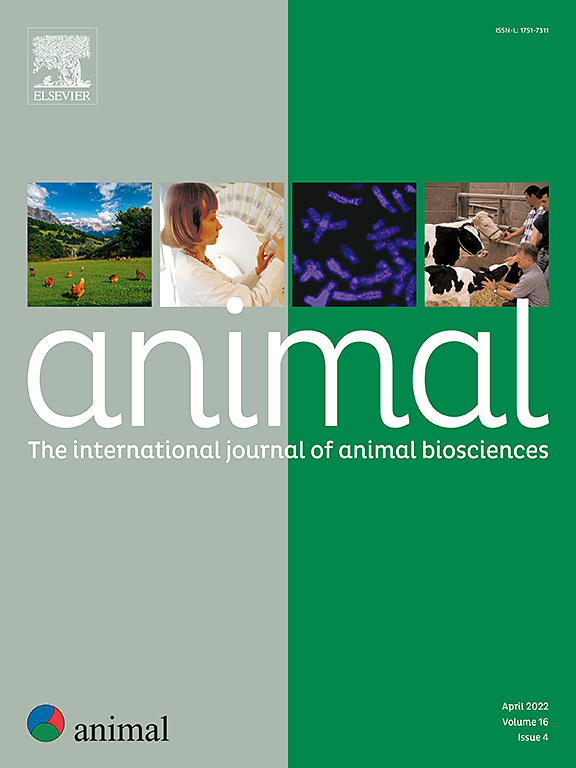Live black soldier fly larvae as environmental enrichment for native chickens: implications for bird performance, welfare, and excreta microbiota
IF 4
2区 农林科学
Q1 AGRICULTURE, DAIRY & ANIMAL SCIENCE
引用次数: 0
Abstract
Dietary live insect larvae were recently proposed for use in laying hens and broiler−intensive chicken farming as an innovative form of environmental enrichment, but their use in native dual-purpose chickens has never been investigated. This study aims to evaluate the effects of live black soldier fly (BSF) larvae as environmental enrichment in two autochthonous dual-purpose chicken breeds, namely Bionda Piemontese (BP) and Bianca di Saluzzo (BS), in terms of bird performance, behaviour, integument status, excreta corticosterone metabolites (ECMs), and microbiota analyses. A total of 90 BP and 90 BS hens aged 308 days old were randomly distributed between two treatment groups (three replicates/group/breed, 15 hens/replicate). For the following 90 days, the control group (C) was fed a commercial feed only, whereas the BSF group was fed the commercial diet plus BSF live larvae calculated at 6% of the expected daily feed intake (DFI). Larva ingestion time, bird performance, integument scores, and behavioural observations were assessed at regular intervals, and excreta samples were collected to evaluate ECM and microbiota. The larva ingestion time became faster over the course of the experimental trial (P < 0.001). The DFI of BSF-fed hens was lower than that of C hens independently of breed (P < 0.001), whereas only in the BS hens, the live weight of the BSF-fed group was greater than that of the C group (P < 0.01). The BSF-fed BP hens showed a higher laying rate and feed conversion ratio compared with BSF-BS (P < 0.05). Better total integument scores were observed in BSF-fed BP hens compared with C-birds (P < 0.05). The BSF-fed hens displayed higher frequencies of preening, trotting, and wing flapping than C, as well as a lower incidence of severe feather pecking (P < 0.05). An increase in allopreening was only identified in BSF-fed BS hens with respect to the C hens (P < 0.001). No differences in ECM and faecal microbiota were observed between treatment groups. In conclusion, the administration of BSF live larvae as environmental enrichment has the potential to positively influence the welfare of both BP and BS chickens, by enhancing the frequency of positive behaviours whilst reducing severe feather pecking, without affecting their excreta microbiota. BSF larva administration also has the potential to improve the productive performance and the plumage status of the BP breed.
将活体黑兵蝇幼虫作为本地鸡的环境富集物:对鸡的表现、福利和排泄物微生物群的影响
最近,有人提出将活体昆虫幼虫作为一种创新的环境富集形式,用于蛋鸡和肉鸡密集型养殖,但从未对其在本地两用鸡中的应用进行过调查。本研究的目的是评估活的黑兵蝇(BSF)幼虫作为环境富集物对两个本地两用鸡品种(即皮埃蒙特比昂达(BP)和萨卢佐比安卡(BS))的影响,包括鸡的性能、行为、全身状况、排泄物皮质酮代谢物(ECMs)和微生物群分析。总共 90 只 308 日龄的 BP 和 90 只 BS 母鸡被随机分配到两个处理组(每组/品种 3 个重复,每个重复 15 只母鸡)。在随后的 90 天里,对照组(C)只饲喂商品饲料,而 BSF 组则饲喂商品饲料和 BSF 活幼虫,幼虫量按预期日饲料摄入量(DFI)的 6% 计算。每隔一段时间对幼虫摄食时间、鸟类表现、全身评分和行为观察进行评估,并收集排泄物样本以评估 ECM 和微生物群。在实验过程中,幼虫摄食时间变得更快(P < 0.001)。饲喂 BSF 的母鸡的 DFI 低于饲喂 C 的母鸡,这与品种无关(P < 0.001),而只有饲喂 BS 的母鸡的活重高于饲喂 C 的母鸡(P < 0.01)。与 BSF-BS 组相比,BSF 饲喂 BP 组母鸡的产蛋率和饲料转化率更高(P < 0.05)。与 C 型蛋鸡相比,BSF 饲喂 BP 型蛋鸡的全身评分更高(P < 0.05)。饲喂 BSF 的母鸡比饲喂 C 的母鸡有更高的打鸣、小跑和拍翅频率,严重啄羽的发生率也更低(P < 0.05)。只有饲喂 BSF 的 BS 母鸡的异绿现象比饲喂 C 的母鸡多(P < 0.001)。各处理组之间的 ECM 和粪便微生物群没有差异。总之,施用 BSF 活幼虫作为环境富集物有可能对 BP 鸡和 BS 鸡的福利产生积极影响,在不影响排泄物微生物群的情况下,提高积极行为的频率,同时减少严重的啄羽行为。饲喂 BSF 幼虫还有可能改善 BP 品种的生产性能和羽色状况。
本文章由计算机程序翻译,如有差异,请以英文原文为准。
求助全文
约1分钟内获得全文
求助全文
来源期刊

Animal
农林科学-奶制品与动物科学
CiteScore
7.50
自引率
2.80%
发文量
246
审稿时长
3 months
期刊介绍:
Editorial board
animal attracts the best research in animal biology and animal systems from across the spectrum of the agricultural, biomedical, and environmental sciences. It is the central element in an exciting collaboration between the British Society of Animal Science (BSAS), Institut National de la Recherche Agronomique (INRA) and the European Federation of Animal Science (EAAP) and represents a merging of three scientific journals: Animal Science; Animal Research; Reproduction, Nutrition, Development. animal publishes original cutting-edge research, ''hot'' topics and horizon-scanning reviews on animal-related aspects of the life sciences at the molecular, cellular, organ, whole animal and production system levels. The main subject areas include: breeding and genetics; nutrition; physiology and functional biology of systems; behaviour, health and welfare; farming systems, environmental impact and climate change; product quality, human health and well-being. Animal models and papers dealing with the integration of research between these topics and their impact on the environment and people are particularly welcome.
 求助内容:
求助内容: 应助结果提醒方式:
应助结果提醒方式:


